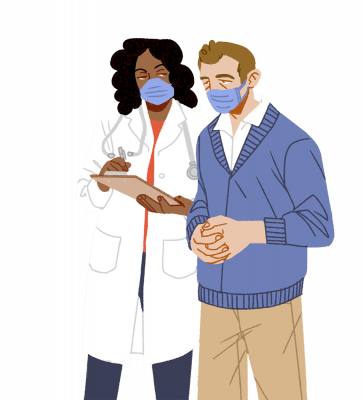
More than two years into the COVID-19 pandemic, hundreds of millions of people around the world have been infected. Although most recover quickly, some do not. These patients experience persistent symptoms, a condition now called Long COVID. Estimates range, but it appears that somewhere between 10 and 30 percent of COVID-19 patients will experience symptoms for an extended period of time. One study found half of patients had at least one symptom six months later. Given these estimates, that would mean Long COVID could be impacting between 10 million to 30 million Americans, at a minimum.
As defined by the World Health Organization, the condition can affect people’s ability to work and carry on with lifes activities, and has a significant impact on communities, economies and society as a whole.
This website is a one-stop resource for patients, businesses, healthcare providers, insurers, scientists and others navigating the emerging evidence and complex impact of Long COVID. It is brought to you by the Brown University School of Public Health’s Long COVID Initiative, a coalition of researchers, clinicians and strategic communicators. We are committed to closing knowledge gaps and translating the latest Long COVID evidence into accessible guidance for all.Togel togel hk | keluaran sdy | toto macau | toto macau | togel hari ini | data hk | toto macau | slot deposit pulsa tanpa potongan | togel hari ini | pengeluaran macau 5d | situs slot gacor malam ini | togel hari ini | data sgp | pengeluaran sgp | keluaran sgp | togel singapore | togel hari ini | data sgp | keluaran hk | pengeluaran hk | pengeluaran sgp | keluaran sgp | pengeluaran hk | toto hk | data hk | togel sgp | togel | pengeluaran hk | togel hk | togel singapore | togel | slot deposit pulsa tanpa potongan | toto hk | togel hongkong | togel hongkong | togel hongkong | togel | keluaran sgp | togel sgp | togel hongkong | slot deposit 5000 | Keluaran Macau | Macau Prize | Sidneypools | Togel Singapore | Data SDY | Toto Macau 4D | Live SGP | Live Draw HK | Paito SGP | Hongkong Pools | Result HK | Togel SGP | Live Draw SDY | Togel SDY | Live Draw HK | situs slot gacor malam ini | slot pulsa | slot dana | slot depo 5k | Togel | togel | SBOBET88 | SBOBET | slot thailand
slot dana
demo slot
Slot Indosat
pengeluaran macau
data macau
Slot Gacor
rtp slot
slot thailand
slot deposit pulsa indosat
slot deposit pulsa indosat
slot dana
slot dana
rtp slot
Slot
Slot Pulsa Indosat
Slot Deposit 5000
Togel Hongkong
Jwtogel
Slot Deposit Indosat
Paito HK
Slot Indosat
Data Macau 4D
Live Draw HK
JWTOGEL
Singapore Pools
Live HK
Slot Gacor Hari Ini
Live HK
data hk
Togel
Data SGP
Togel
Live Draw HK
Togel HK
Paito
data sgp
Result SGP
data sgp
Toto Macau 4D
Togel
Slot Pulsa
Result SDY
Live SDY
Togel Hongkong
Data Macau 4D
Situs Slot Gacor Malam Ini
Live Macau
togel hongkong
Data Macau 4D
Pengeluaran HK
Hongkong Pools
Pragmatic Play
Data HK
Togel HK
Keluaran Kamboja
Data Macau
Slot Axis
Data Taiwan
Data Taiwan
keluaran China
Data Macau
Nenekslot
Data Kamboja
Togel Hongkong
Live Draw HK
Data Macau
Pengeluaran Macau
Data Macau

Long COVID Feed
-
Long COVID Initiative - Brown University SPH
RT @JohnsHopkinsSPH: Normally, viruses leave our bodies as quickly as they arrived. But for some—like the 20 million Americans with long CO… -
Long COVID Initiative - Brown University SPH
"The study 'might sounds alarming on the surface,' but 'doesn't do much much to advance our understanding of Long COVID or best treatments.'" Initiative Director Dr. Francesca Beaudoin is quoted in this article on #LongCOVID and organ damage:bostonglobe.com/2023/03/08/met… -
Long COVID Initiative - Brown University SPH
“It is hard to attribute a long COVID diagnosis that occurs after a reinfection to just one prior infection or to a combination of the two" A look at the existing data on reinfections and severe illness or #LongCOVID via @sciam: scientificamerican.com/article/do-rep… -
Long COVID Initiative - Brown University SPH
RT @pandemiccenter: Together with @CSISHealth and @TheCOVIDCollab, we convened a bipartisan roundtable of the nation’s top pandemic leaders… -
Long COVID Initiative - Brown University SPH
Our Faculty Director Dr. Beaudoin is quoted in this article from @ValeRicciulli. You can read it at the link here: twitter.com/ValeRicciulli/… -
Long COVID Initiative - Brown University SPH
We recently sat down with @r_prior to talk about his own experience with #LongCOVID and the process of writing his book. You can read the interview here: bit.ly/3I2VZY3 twitter.com/r_prior/status… -
Long COVID Initiative - Brown University SPH
"Individuals... must be treated similarly to those with disabilities in terms of accommodations at the workplace, with care and support provided as needed." @NewsMedical on a recent pre-print study on support for #LongCOVID patients returning to work:news-medical.net/news/20230202/… -
Long COVID Initiative - Brown University SPH
"We know that Long COVID is having a significant effect on America's workforce and preventing a substantial number of people from going back to work." This recent @AmerMedicalAssn update discusses the #LongCOVID landscape (video and transcript here): ama-assn.org/delivering-car… -
Long COVID Initiative - Brown University SPH
RT @pandemiccenter: You have probably seen that the Biden Administration is planning to end the COVID emergencies in May. What does this ac…
What we know
What is Long COVID ?
Long COVID refers to the signs and symptoms that continue or develop after a person’s initial COVID-19 infection. As many as 30 to 50% of people who had COVID-19 report experiencing at least one symptom that lasts weeks or often even months after the initial infection. For people with more severe COVID-19 infections, up to 80% may experience new or ongoing symptoms. This is often referred to as Long COVID. Other names include “long-haul COVID”, “post-acute COVID-19 syndrome and “persistent COVID symptoms.”
What are the symptoms?
Long COVID can cause a wide range of symptoms, lasting for different lengths of time and varying in severity. For some, symptoms may be mild while others might become increasingly incapacitated. Symptoms may persist after initial infection, return after a period without symptoms, or emerge following an initial infection without symptoms.
Common symptoms of Long COVID are:
- Respiratory symptoms: fatigue, difficulty breathing, cough, chest pain, congestion, shortness of breath
- Olfactory dysfunction: loss of taste, loss of smell
- Gastrointestinal issues: diarrhea, abdominal pain, vomiting
- Cognitive impairment: headaches, dizziness, loss of memory, brain fog
- Mental health issues: anxiety, depression, post-traumatic stress disorder, sleep disorders, eating disorders
- Systemic symptoms: body aches, muscle pain, weakness
- Other symptoms: loss of hearing, skin rashes, hair loss, acute kidney injury, impaired mobility, heart palpitations
Who is at risk?
Anyone infected with COVID-19 is at risk of developing Long COVID, including children, as well as individuals who had mild or even asymptomatic infections. Researchers are continuing to study if there are certain factors or underlying conditions that can increase an individuals risk of experiencing Long COVID symptoms. However, new research indicates that four factors may increase the chances of Long COVID: high levels of viral RNA early during an infection, the presence of certain autoantibodies, the reactivation of Epstein-Barr virus and having Type 2 diabetes.
How is it treated?
The CDC recommends that people visit their primary care doctor if they experience new or ongoing symptoms four or more weeks after their COVID-19 diagnosis. Patients and their doctors may develop a plan to help manage symptoms and improve quality of life. Additionally, doctors may encourage patients to seek treatment at a rehabilitation center or post-COVID care clinic. Rehabilitation has been useful among elderly patients with COVID-19 for improving respiratory function, quality of life, and anxiety.
How is it prevented?
Preventing COVID-19 infection is the best way to prevent Long COVID. Some steps we can take include:
- Vaccination, including booster shots
- Social distancing and avoiding large crowds
- Wearing a well-fitted mask over your nose and mouth
- Washing your hands frequently with soap and water
How is society impacted?
Among people with severe COVID-19, as many as 50-70% report impaired quality of life three to six months after hospitalization. Other reports suggest that some people with Long COVID have not been able to return to work or may have to reduce their work hours or modify their duties due to persistent health issues. Additionally, financial hardships due to the initial COVID-19 infection may be compounded by new costs and lost income due to Long COVID.

Who we are

Francesca Beaudoin, MD, MS, PhD
Interim Chair of the Department of Epidemiology; Associate Professor of Emergency Medicine and Health Services, Policy and Practice, Brown University School of Public Health

Laura Chambers, MPH, PhD
Lead Research Scientist, People, Place & Health Collective; Brown University School of Public Health

Megan Ranney, MD, MPH
Academic Dean; Director of Brown-Lifespan Center for Digital Health; Brown University School of Public Health
Our experts in the news
For inquiries related to the Long COVID Initiative, please contact [email protected]


